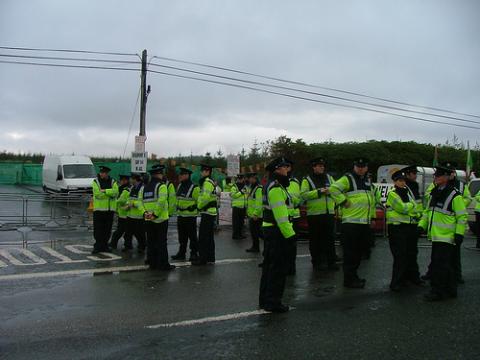Press Ombudsman finds Sunday Independent article ‘significantly misleading’

The Press Ombudsman has upheld a complaint against the Sunday Independent over an article by Jim Cusack about the women at the centre of the Corrib garda “rape” recording. He has found that the article was “significantly misleading” and that it reported rumour as fact.
The complaint was brought by Jerrie Ann Sullivan, one of the two protesters whose arrest in Mayo on 31 March 2011 led to a garda sergeant and his colleagues accidentally recording themselves with a digital video camera. During the conversation, they talked about threatening to rape one of the women in their custody.
The wording of the decision is convoluted, due to the complex nature of the case. However, viewed together with Cusack’s article (‘Rape’ claims were hurled at gardai by protesters), the Ombudsman’s decision reveals a crude and highly incompetent attempt to undermine the credibility of the women who brought the recording to public attention.
What the newspaper did (on 19 June 2011) was to publish as fact a bizarre rumour about the two women: that they had shouted the words “rape” during the arrest and that this had provided “a context” in which the arresting gardaí made jokes about raping them. To corroborate this rumour, as well as unnamed gardaí as his source - Cusack cited “a video tape” that supposedly showed the women shouting “rape”.
The women have always categorically denied that they mentioned the word “rape” during their arrest. As soon as Cusack’s story appeared last June, Jerrie Ann Sullivan and Shell to Sea pointed out that Cusack’s video clip was clearly of a different incident on a different day and involved different protesters. The campaign sent a letter to the newspaper in June, pointing this out and demanding an apology. The newspaper did not apologise. (See here for more on this.)
Now the Press Ombudsman has agreed with Jerrie Ann Sullivan and the campaign: he says Jim Cusack’s article relied on a video clip of a different protest in a way that was “significantly misleading”. Not only that, the Press Ombudsman states that he has viewed Cusack’s video clip (the one of the wrong protest) and points out that “the sound is distorted and it is impossible to distinguish any voices or words from it.”
In other words, even if Cusack and his newspaper believed that the video clip they were given was of the correct incident, they would still have been using a clip that did not provide clear evidence that the protesters in it were saying “rape”.
The use of this rumour – “the women said rape first” – is baffling: the implication is that this would somehow mitigate the behaviour of the Sergeant and gardaí in the squad car: an echo of the old notion that a woman’s behaviour can be blamed for sexual violence against her.
Interestingly, this rumour is also given a central role by the Garda Síochána Ombudsman Commission (GSOC) in its Interim Progress Report into the garda rape comments incident, which appeared in late July. As with the Sunday Independent article, the GSOC report appears to attempt to undermine the credibility of the two women while simultaneously downplaying and deflecting attention from the behaviour of the Sergeant and gardaí on 31 March.
Despite the fact that GSOC interviewed Jerrie Ann Sullivan for several hours, and that she told GSOC that neither she nor the other woman had used the word “rape”, the only person quoted in the GSOC report is an anonymous “detective garda”. He is quoted at length saying he heard one of the women mention “rape”, though he says he is “not sure of the exact words used” and, as his back was turned, he “cannot say which protester said this.”
The GSOC report is highly problematic for several further reasons and there are serious questions to be asked about its approach to this case. However, these are questions for another day.
——————
The “oil and gas giveaway”, which has become a topic of public debate recently, is not the only problem with Ireland’s licensing system for hydrocarbons. The manner in which the Government manages its mineral resources and the way the State interacts with Big Oil has far-reaching and long-lasting environmental, political and social consequences.
The Irish State has conflicting roles as both developer and regulator of the Corrib Gas project. The political urgency attached to “bringing the gas ashore” naturally pushes the various agencies and agents of the State (the EPA, An Bord Pleanála, Mayo Co Council, the courts etc) into favouring oil companies at the expense of the receiving community. It also thrusts An Garda Síochána into physical confrontation with local residents and their supporters. The policing of the Corrib protests has been the subject of widespread international criticism. The two women who made the recording of rape comments on 31 March public were seeking to highlight the atmosphere of intimidation and abuse that is a feature of daily life for many people close to Shell’s refinery site at Bellanaboy.
Mainstream journalists are similarly thrust into the frontline of this conflict between the State and objectors. The relationship of dependency between crime correspondents and gardaí is a well-known phenomenon and is worth bearing in mind when people who make gardaí look bad are undermined in newspaper articles.
It is important also to note that the family that controls the Sunday Independent - Tony O’Reilly and sons - also own 35% of the shares in Providence Resources, an exploration company with huge oil and gas prospects around the coast of Ireland. The protesters smeared by articles such as the one referred to above are also campaigning against licensing terms that will bring generous profits to companies such as Providence. Journalists at O’Reilly newspapers who undermine Corrib protesters are - either knowingly or unknowingly - helping to fight their employers’ cause.
Image top: Labour Youth.
